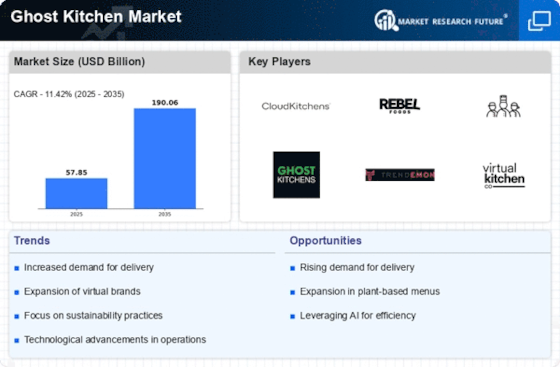Top Industry Leaders in the Ghost Kitchen Market

Market share analysis within the ghost kitchen sector is driven by various factors, with geographic presence, technology infrastructure, and partnerships standing out as crucial determinants. The ability to secure strategic locations for ghost kitchens in densely populated areas is a key element for capturing market share. Additionally, investments in state-of-the-art technology, including order management systems and kitchen automation, contribute to operational efficiency, attracting both restaurant partners and customers. Collaborations with popular restaurant brands and chains also play a pivotal role in market share dynamics, enabling ghost kitchen operators to diversify their offerings and cater to a broader consumer base.
As the ghost kitchen market matures, new and emerging companies are making significant strides, contributing to the sector's competitiveness. Start-ups like Reef Kitchens and Zuul Kitchens are capitalizing on niche markets, specializing in specific cuisines or catering to unique consumer preferences. These companies often prioritize agility, utilizing modular kitchen designs and cloud-based technology to swiftly adapt to changing market demands. The industry is witnessing a surge in innovation, with companies exploring novel concepts like virtual food halls and micro-fulfillment centers, further intensifying competition and reshaping the traditional restaurant landscape.
Industry news within the ghost kitchen market reflects ongoing trends, regulatory considerations, and the evolving competitive dynamics. News surrounding partnerships and collaborations, such as alliances between ghost kitchen operators and established restaurant brands, frequently make headlines. Regulatory developments, particularly those related to zoning laws and health and safety standards for shared kitchen spaces, also influence the industry's trajectory. Additionally, advancements in technology, such as the integration of artificial intelligence and robotics in kitchen operations, capture industry attention, showcasing a commitment to enhancing efficiency and meeting the rising demand for contactless dining experiences.
Current investment trends underscore a substantial influx of capital into the ghost kitchen sector, with a focus on technology development, infrastructure expansion, and market consolidation. Major players are allocating significant resources to enhance their technological capabilities, incorporating data analytics and machine learning to optimize operations and improve customer satisfaction. Investments are also directed towards expanding physical infrastructure, securing prime locations for ghost kitchens in key urban centers, and establishing partnerships with both established and emerging restaurant brands. The sector's growth potential has attracted venture capital and private equity firms, further fueling the competitive landscape and signaling confidence in the long-term viability of the ghost kitchen model.
In summary, the overall competitive scenario in the ghost kitchen market is marked by a strategic alignment of key players, each pursuing distinct approaches to capitalize on the changing dynamics of the food service industry. Established players are leveraging their scale and technological prowess, while new entrants are injecting innovation and agility into the market. Market share analysis hinges on factors like geographic reach, technology infrastructure, and strategic partnerships. As the industry continues to evolve, keeping pace with regulatory developments, fostering innovative solutions, and meeting the diverse preferences of consumers will be critical for sustained success in this competitive landscape.
Industry News and Investment Landscape
- Recent deals, such as Reef Technology's purchase of Kitchen Central and SoftBank's financing of Kitchen United, demonstrate the increasing trust of investors in the market.
- Acquisitions and mergers, such as DoorDash's acquisition of ChowNow, point to tendencies of consolidation in the meal delivery and ghost kitchen industries.
- Ghost kitchens' operational environment is being influenced by labor market dynamics and regulatory developments in many regions.
Key Companies in the Ghost Kitchen Market Includes
- United Kitchen
- Rebel Foods
- DoorDash Kitchens
- Ghost Kitchen Orlando
- ShoppinPal
- Posist Technologies
- Kitopi
- Oracle
- Uengage Services Pvt Ltd
- Slay Coffee











